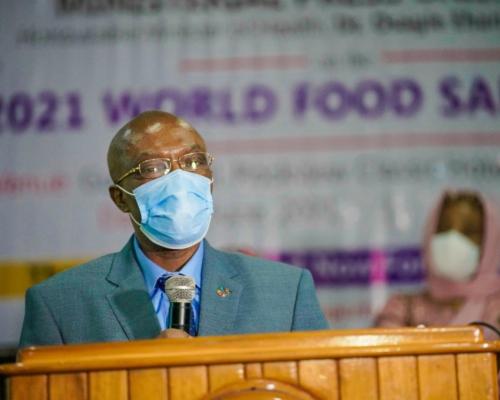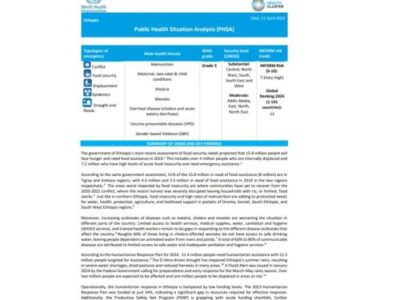
Abuja June 7, 2021 – “My stomach started aching, I threw up all day, as if my entire digestive system wants to come out. I felt very weak. I couldn’t understand what was happening around me. I was rushed back to the shores for medical treatment”, narrated 48-year-old Mr. Azok Nsirem, a fisherman in Andoni, Rivers State after eating contaminated moi-moi, a local delicacy made from beans.
Like Mr. Nsirem, millions of other Nigerians share similar experience after eating contaminated food.
Burden of food borne diseases
Food contamination is a severe public health problem around the world, resulting in food-borne diseases that affect human beings every year. It is caused by microorganisms such as bacteria, viruses, helminths, chemical contaminants and physiological factors. Microorganisms that grow in foods may cause changes in appearance, flavor, odor, and other features of the foods.
Unsafe food containing pathogenic bacteria, viruses, helminths or chemical substances, causes more than 200 diseases – ranging from diarrhea to cancers. Foodborne diseases are caused by contamination of food and occur at any stage of the food production, delivery and consumption chain. They can result from several forms of environmental contamination including pollution in water, soil or air, as well as unsafe food storage and processing.
According to WHO, an estimated 600 million – almost 1 in 10 people in the world – fall ill after eating contaminated food and 420 000 die every year, resulting in the loss of 33 million healthy life years (DALYs) and children under five years of age bear 40% of the foodborne disease burden, with 125 000 deaths every year.
UN Global Action on food safety
Consequently, in 2018, the United Nations General Assembly adopted resolution 73/250 proclaiming 7 June as World Food Safety Day, taking into account the global burden of foodborne diseases, which affect individuals of all ages, in particular children under five and persons living in low-income regions. The resolution acknowledges that “there is no food security without food safety and that in a world where the food supply chain has become more complex, any adverse food safety incident may have global negative effects on public health, trade and the economy”.
Commemorating World Food Safety Day 2021
World Food Safety Day (WSFD) is observed annually on 7 June to help prevent, detect and manage foodborne risks to provide food security and highlight different areas relating to human health, economic prosperity agriculture, market access, and tourism, and sustainable development, according to the WHO.
The theme for this year: ‘Safe food today for a healthy tomorrow’, emphasizes that production and consumption of safe food has immediate and long-term benefits for people, the planet, and the economy. Recognizing the systemic One-Health connections between the health of people, and the future.
Briefing media personnel to commemorate 2021 World Food Safety Day in Nigeria, the Minister of State for Health, Dr Adeleke Mamora said, “production and consumption of safe food have a long-term benefit to the society in general. One of the major pillars of Universal Health Coverage (UHC) is disease prevention and one of the major ways of disease prevention is food safety.” He further stated that, “just as the other nations of the world are looking at modernizing their food safety structure to meet with required international standards, the Federal Government in 2015 launched the National Policy on
Food Safety and its implementation strategy as well as inaugurated food committee to ensure that food produced and sold in Nigeria is safe and wholesome for consumption.”
The minister also stressed the commitment of the Federal Government, “to continue to work with private sectors and non-state actors, including the media with whom we have shared concerns and obligations to foster universal safety of foods in Nigeria towards ensuring Nigeria stays in optimal health.”
At the event, Dr Walter Kazadi Mulombo, the World Health Organization (WHO) Representative to Nigeria noted that “COVID-19 has not been transmitted by food but the pandemic has highlighted the weaknesses and vulnerabilities in food production and control systems which has sharpened the focus on food safety-related issues, such as personal hygiene, WASH, antimicrobial resistance, zoonotic diseases, climate change, food fraud, and the potential benefits of digitalizing food systems”.
He further highlighted the need to strengthening One-Health connections through food safety and called upon Nigeria to enforce of food safety measures in all settings and sectors.
Recognizing the significant role that women play in the promotion of food safety and home hygiene, WHO already trained 345 women leaders from Edo and Ondo States on food hygiene and domestic sanitation towards the prevention of Lassa fever.
WHO is also working with Federal and State Ministries of Health and other regulatory agencies to advocate for food safety as an important component of health security and for integrating food safety into national policies and programs in line with the International Health Regulations. ”
Technical Contacts:
Dr Kelias Msyambozak; Email: msyambozak [at] who.int; Tel: +234 906 278 4292
Dr EDEH, Edwin Isotu, Email: edehe [at] who.int; Tel: +234 806 872 7856











Comments